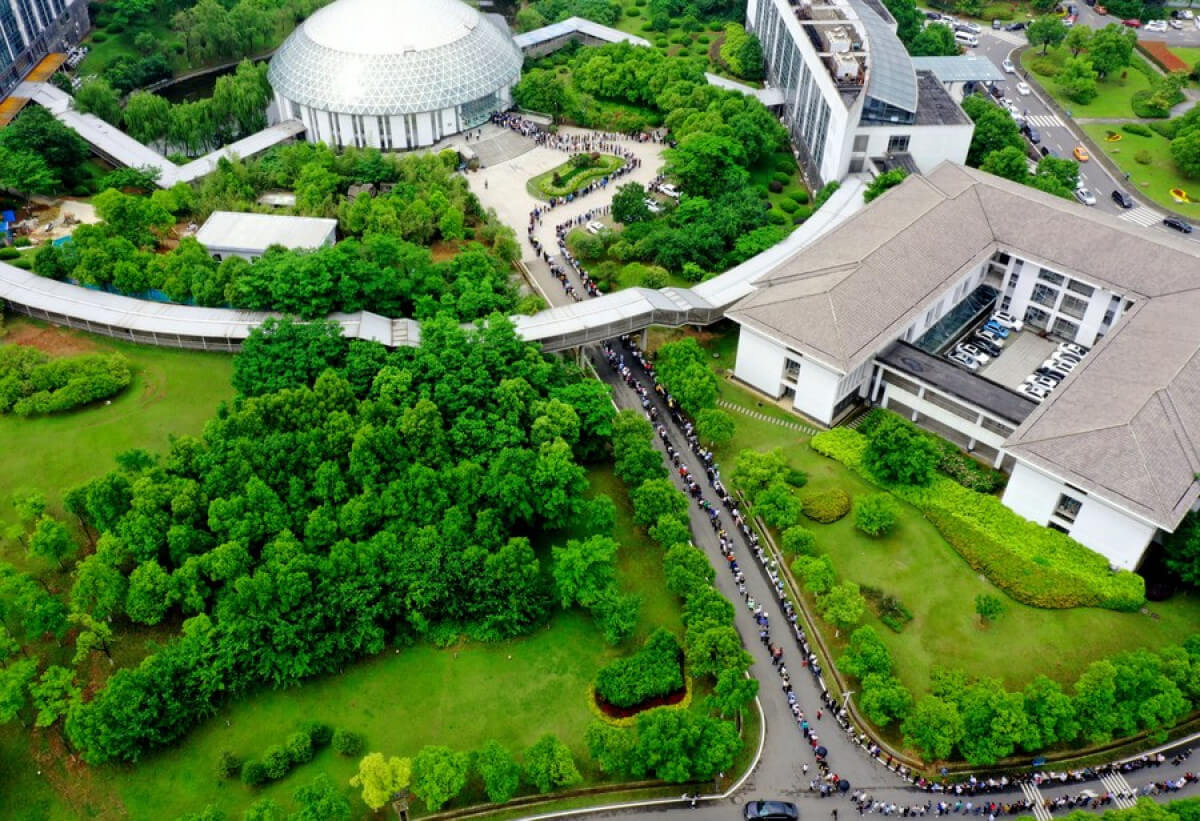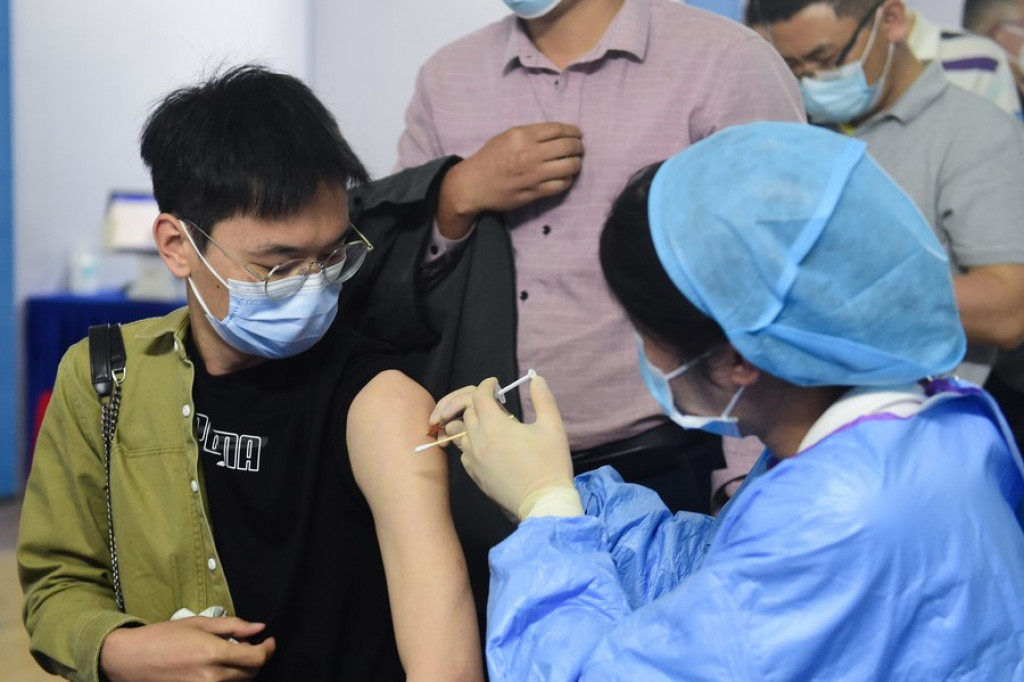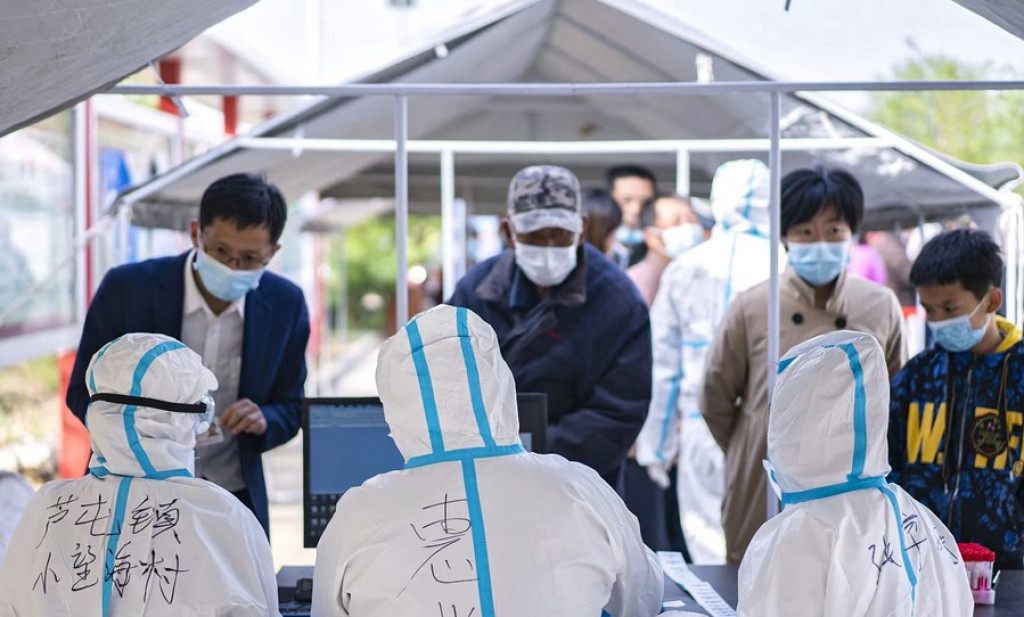
Aerial photo taken on May 14, 2021 shows people waiting for nucleic acid sampling at a testing site in Lu'an City, east China's Anhui Province. (Photo by Xinhua)
China is working at full throttle to vaccinate its people against COVID-19, as over 400 million doses had been administered as of Sunday, just nine days after the figure surpassed 300 million doses.
It took 17 days for the number of COVID-19 vaccines administered on the Chinese mainland to exceed 300 million doses from 200 million doses, and 26 days from 100 million doses to 200 million doses, according to daily updates by the National Health Commission.
The accelerated mass vaccination drive has been partially spurred by the latest COVID-19 outbreaks in east China's Anhui Province and northeast China's Liaoning Province, which had seen 16 confirmed locally transmitted cases in total as of Sunday evening.
Long queues were seen at multiple vaccination sites in Hefei, capital city of Anhui. A temporary vaccination site has been set up in the Second Hospital of Anhui Medical University to meet the surging demand since May 14.
Duan Yichen, a Hefei citizen, queued up at the hospital in the early morning the next day.
"I had thought of it before, but I never went. The recent outbreaks made me realize the importance of vaccination," Duan said. "Getting vaccinated without delay means taking responsibility for yourself and the well-being of others."

A citizen receives a dose of COVID-19 vaccine at a vaccination site in Hefei, east China's Anhui Province, May 16, 2021. (Xinhua)
To ensure orderly vaccination, the hospital has adopted a booking system. Areas for waiting, registration, injection and observation were isolated from the rest of the hospital and arranged following a one-way route.
As of May 14, Hefei had administered over 2.6 million doses. The day also witnessed the city's highest daily inoculation number so far -- 364,100 doses.
The city currently has more than 7,100 medical staff for COVID-19 inoculation and treatment, capable of administering 300,000 jabs a day in normal circumstances.
The city of Shenyang, capital of Liaoning, has set up over 300 vaccination sites capable of administering 200,000 doses a day.

Residents of Xiaowanghai Village wait to have a second round of nucleic acid testing in Bayuquan District, Yingkou City, northeast China's Liaoning Province, May 16, 2021. (Xinhua)
"Since May 12, Shenyang has seen more than 100,000 doses be administered every day. About 154,000 doses were administered on Thursday, the highest figure in recent days," said Dong Guihua, deputy director of the city's center for disease control and prevention.
A mobile inoculation vehicle has appeared in Shenyang's downtown area, which can serve three people at the same time.
"If a pedestrian wants to get vaccinated, he or she can simply show their ID card, scan the QR code and fill in their information," said Zhang Ge, a local health official. "We expect to vaccinate about 1,100 people a day."
Zhao Xin, director of Huanggu Hospital under the Northeast International Hospital of Shenyang, said COVID-19 vaccination is currently irreplaceable in preventing the spread of the virus, adding that the number of citizens going to vaccination sites for inquiries has increased significantly.
According to the local health authorities, none of the confirmed cases from the two provinces had been vaccinated.
Gene sequencing analysis conducted by the provincial center for disease control and prevention of Anhui found the coronavirus strains behind the cases were not the highly infectious variants found in India and South Africa.
In the meantime, citywide nucleic acid tests were immediately launched, while dozens of neighborhoods were sealed off and labeled as medium- or high-risk areas.
As of Sunday noon, nearly 1.14 million people in Anhui's medium- and high-risk areas tested negative for the novel coronavirus. Experts have effectively ruled out the possibility of mass infections in the province.
"Vaccination is a great way to achieve herd immunity. The vaccination rate in China is still low and behind many countries. So we need to step up efforts to raise our vaccination rate to 70 to 80 percent as soon as possible," Zhong Nanshan, a renowned Chinese respiratory disease expert, said after he received a dose of a China-developed COVID-19 vaccine recently in Guangzhou, Guangdong Province.
"I hope, together, we can do what we can to help stem the pandemic for our country, the world, and ourselves," Zhong said.












